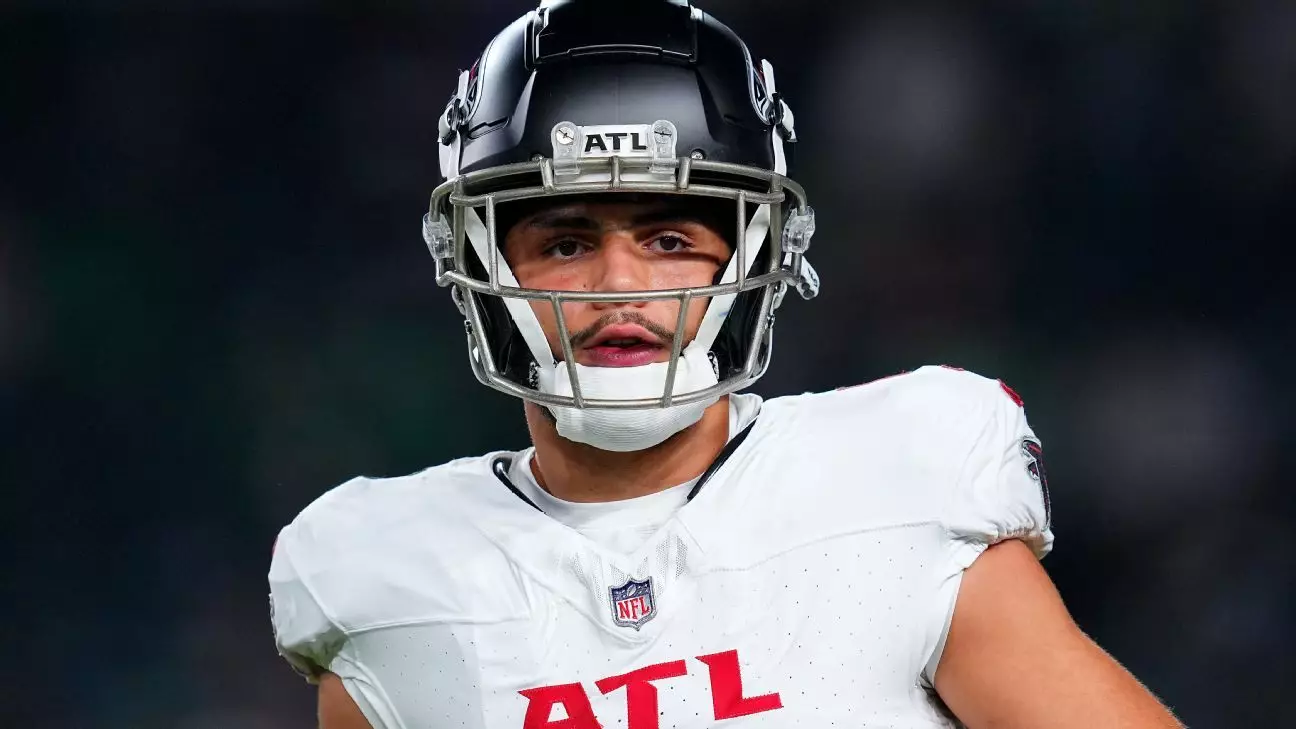In the high-stakes world of professional football, emotions run high, and celebrations often become a huge part of the narrative. Thus, when Atlanta Falcons wide receiver Drake London scored a crucial touchdown against the Philadelphia Eagles, he understandably felt elated. However, the ensuing celebration—a gesture mimicking shooting a gun into the air—sparked a controversy that has since drawn attention. Celebrated for his athletic prowess, London now finds himself grappling with the responsibility that comes with his platform, especially in a time marked by gun violence and its societal implications.
The duality of London’s experience—joy for a team triumph mixed with regret over his celebratory choice—highlights a growing tension in sports: the impact of actions beyond the field. Celebrations in football, often embodied by spontaneous expressions of joy, are meant to galvanize fans and celebrate success. Yet, London’s actions took a different turn as the symbolism of gun violence in America loomed large. Recognizing this, London expressed his dissatisfaction with the incident, underscoring a profound realization that, as public figures, athletes carry the weight of their choices.
In a reflective moment following the game, London articulated that his celebration became untenable in light of the recent violence in the community surrounding the Falcons’ headquarters. He stated, “There’s a lot of stuff going around in the world with gun violence that I don’t think I should have displayed there.” The acknowledgment of his misstep reveals an essential aspect of maturity: understanding the broader context in which one’s actions are interpreted, particularly as they relate to sensitive societal issues.
Falcons head coach Raheem Morris echoed London’s sentiments, highlighting the delicate balance athletes must navigate between personal expression and public perception. Morris emphasized the necessity of being acutely aware of the social environment surrounding the team, particularly as they engage with local communities impacted by violence. “Drake was just having fun with his fan base,” he noted, yet he recognized the potential fallout of such actions amidst the country’s pervasive gun violence issue.
The coaching staff’s response reflects a crucial aspect of leadership in sports: the need to guide young athletes in understanding their influence. By fostering a dialogue about the ethical implications of actions both on and off the field, coaches can help players navigate their responsibilities as role models. Morris’ response points toward a culture of sensitivity within the team, which also aims to promote awareness of poignant issues that extend beyond the lines of a football field.
The Falcons’ commitment to their community becomes evident through their interactions with local issues, such as the tragic event at Apalachee High School—the site of a recent shooting. The team’s decision to wear t-shirts supporting the school during warm-ups for their first game against the Pittsburgh Steelers exemplifies a tangible effort to find solidarity amid pain. London’s misstep serves as a stark juxtaposition to these outreach efforts, emphasizing the complexity of community ties athletes must navigate.
This growing awareness among sports figures indicates a shift in the traditional role of athletes; they now find themselves tasked not only with excelling in their sport but with contributing to broader societal discussions. Such awareness can transform how athletes engage with audiences, forging stronger connections through empathy and understanding rather than neglecting the repercussions of their fame.
Drake London’s reflection on his impulsive celebration and the discussion it ignited demonstrates a crucial reckoning in sports. The interplay between personal expression and societal responsibility is more pronounced than ever, and London’s eventual apology signifies a commitment to maturity—both personally and professionally. Through this introspection, it is evident that the path forward requires athletes to be mindful of their actions, consciously bridging the gap between sport and the larger community narrative.
The Falcons, with their willingness to address sensitive topics and engage with their community, are positioned to be leaders in promoting awareness within sports. As the season progresses, the challenge remains for players to strike the right balance between celebrating victories and respecting the communities they represent. Ultimately, London’s experience offers a lesson for all athletes about the significance of responsible self-expression in an ever-more interconnected world.


Leave a Reply